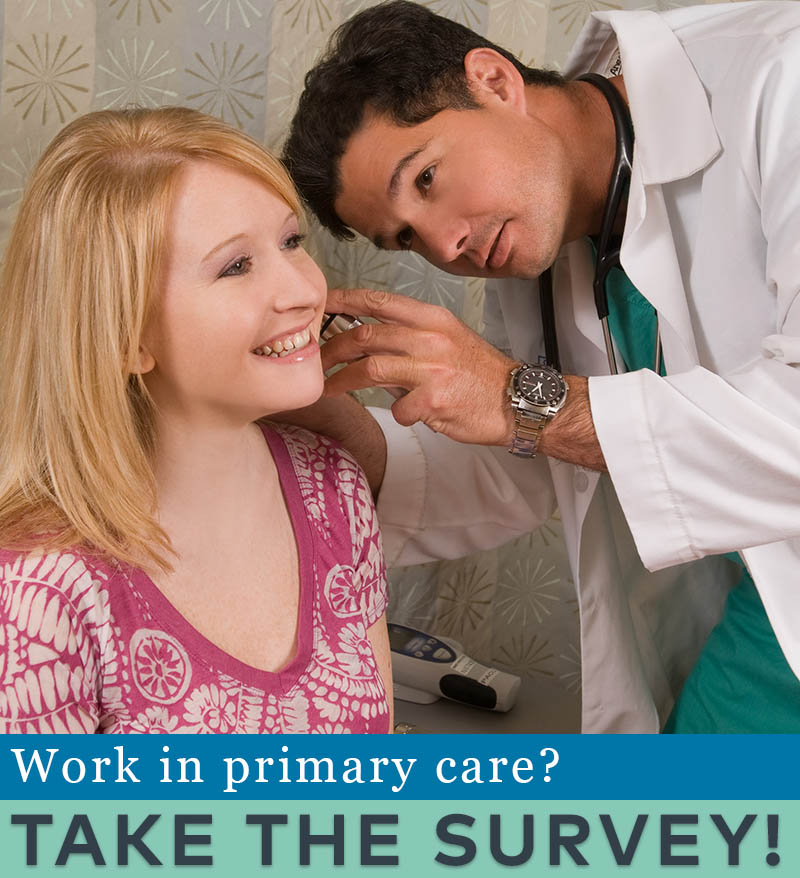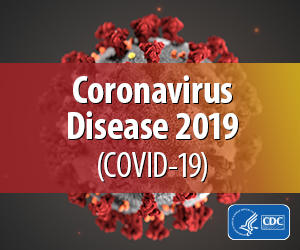You are looking at an archived version of our site. Please visit thepcc.org for a fresh, new experience!
You are here: Array » Primary Care & COV ...
Primary Care & COVID-19: Week 13 Survey
Check back weekly for the latest survey results and updates.
For last week's data, see Week 12 Results.
Who replied to the survey in Week 13?
A primary care clinician survey (weekly) and a patient survey (generally every other week) are being fielded by the Larry A. Green Center in partnership with the Primary Care Collaborative and 3rd Conversation. Both surveys are anonymous and voluntary, using national convenience samples to better understand the impact of COVID-19 on primary care from two important vantage points.
Clinician survey: Week 13 of this survey was conducted June 5-8. There were 586 respondents from 48 states, with 67% identifying as family medicine practices, 17% as internal medicine, 10% as pediatrics, 2% as geriatrics, and 4% as other. Practice settings included 22% rural, 14% community health centers, and 11% in schools/offices. 36% of practices have 1-3 clinicians, 25% have 4-9 clinicians, and 40% have more than 10 clinicians. 35% of practices are self-owned, 13% are independent and large-group, 37% are owned by a health system, 9% are convenience settings, and 5% are membership-based.
Patient survey: Week 3 of this survey was fielded June 8 and captured the experiences of 1,111 patients from across the U.S. over the last eight weeks. Forty-six percent of respondents reported at least a college degree. 34% of respondents were between the ages of 18-35 years old, and 24% were over 55. 53% live in suburban areas, and 43% report earning less than $50,000 per year.
Results at a glance
Patients and clinicians are deeply affected by racism-related events and see a link to their well-being: When patients were asked if the death of George Floyd and related events had either a “noticeable” or “some” effect on them, over 20% reported an impact on their physical health, 36% reported an impact on their mental health, and almost 40% reported an impact on their emotional well-being. Over one-third (35%) responded yes when asked if they thought structural racism is a public health concern.
Primary care clinicians also report that their well-being has suffered as a result of recent racism-related events (31%), and two-thirds report that the death of Floyd and related events have been the topic of practice conversations. Roughly 33% of clinicians feel it was possible that Floyd’s death and related events had an impact on their patients’ health, with 22% reporting that the event has been very upsetting for minority patients in particular.
Patients and clinicians perceive the comprehensiveness of the care being provided during the pandemic differently: Despite the disruption of the COVID-19 shelter-in-place orders, and heightened fears of engaging with the health care system, almost half (over 46%) of patients have been in contact with their primary care practice at least once in the last two months. When patients were asked if they have experienced comprehensive primary care during this time, more than 50% said, “Yes, without a doubt!” When including patients who said they sometimes experienced comprehensive care, high majorities rated such care as continuous (80%), coordinated (80%), and integrated (78%).
While more than 80% of clinicians prioritize providing comprehensive and integrated care and being the first contact for their patients when they are sick, they perceive challenges in providing such care in the midst of a pandemic. Only 20 to 37 % report being able to consistently deliver this kind of care during the pandemic.
Pain points for practices and patients persist: Almost 65% of clinicians report a level of strain of 4 or 5, with 5 being the highest level (down slightly from 69% previously). Factors that consistently contribute to this lack of PPE (48%), being forced to reduce staff (37%), reductions in patient visits for well and chronic care (78%), and rejected claims for virtual health (18%).
Patients are also under strain. Almost 25% of patients report worrying about being able to afford their co-pay for care, and another 27% report that they limit their care because of a high deductible or a lack of cash in their Health Savings Account.
Learn more: Download:
Both include select open-ended answers to survey questions.
Voices from the Primary Care Front Lines
The pandemic has revealed racial inequality in health care, and public unrest has added another layer to the health crisis.
"We already knew that there was racial inequity in health care before the pandemic... now the pandemic as well as George Floyd's murder have brought that to the forefront again. We need to do better by our patients of color." (Clinician in Minnesota)
"The daily protest marches and early curfews have directly impacted all offices in NYC. Patient fear of being caught up, transit interruptions, etc. add another complication to the already overwhelming pandemic precautions. My patients are mostly sympathetic to the protests and upset by the situation. Stress-related complaints skyrocketed this week." (Clinician in New York)
Both clinicians and patients are experiencing mental distress in their environments.
From patients:
“I’ve been anxious lately.” (Illinois)
“I am fearful of touching a door handle and getting sick.” (California)
From clinicians:
“There seems to be no organized plan for anything. It is every man, practice and health care system for themselves.” (Florida)
“This pandemic is so mentally, physically and emotionally exhausting. What does the future hold?” (Florida)
“Feeling burned-out at this time. It is a struggle to continue with telehealth. Not as fulfilling. Much more work.” (California)
“Completely exhausting to try to add in an additional 15-20 hrs/wk negotiating with landlord & creditors, keep up with ever-changing resources and billing/coding/regulatory changes & local public health updates, apply for loans, grants and financial aid, etc., while still taking care of our patients (who require more practical and emotional support in order to engage effectively and cope with rapid changes).” (Colorado)
Despite the enormous challenges, there is hope and gratefulness among both clinicians and patients.
From clinicians:
"We hope to preserve … changes we have made during this time, including an emphasis on a contactless culture, a recall culture, and other ways in which we have distilled our processes down to streamline the clinician-patient interaction." (Michigan)"Family docs are made for these times." (Pennsylvania)
"It re-affirms my choice of profession and the value of primary care." (Maryland)
From patients:
"I feel strongly that we do not acknowledge the value of the profession as much as we should." (Virginia)"My doctor is great and caring." (North Carolina)"My Dr's office requires face masks and does temp checks prior to entering. I felt safe going there." (Michigan)
| Attachment | Size |
|---|---|
| 753.21 KB | |
| 756.54 KB | |
| 501.57 KB |

Are you a physician, nurse practitioner, or PA working in primary care?
Help PCC and the Larry A. Green Center track how your practice is responding to the COVID-19 outbreak by completing the Green Center's occasional survey.
The regular surveys are no longer being conducted.
COVID-19 Updates
May 9, 2022 | Primary Care Collaborative
April 19, 2022 | Primary Care Collaborative
April 19, 2022 | Primary Care Collaborative
March 7, 2022 | STAT
February 27, 2022
- 1 of 39
- next ›

Recent News
August 16, 2024
August 12, 2024
July 16, 2024
May webinar highlights: “The Commercial Market: Alternative Payment Models for Primary Care” Nate Murray explains w… https://t.co/KX9Wi2w6oY —
2 years 8 months ago
@CMSinnovates’ primary care strategy is rooted in a 2021 @theNASEM’s report which called #primarycare “foundational… https://t.co/glbPxvCysg —
2 years 8 months ago
@CMSinnovates has a new #primarycare strategy, envisioning “ACO-based primary care model tests that may focus on pr… https://t.co/aJGF1z411l —
2 years 8 months ago
- Page 1
- ››
Secondary menu
Copyright © 2024 Primary Care Collaborative




